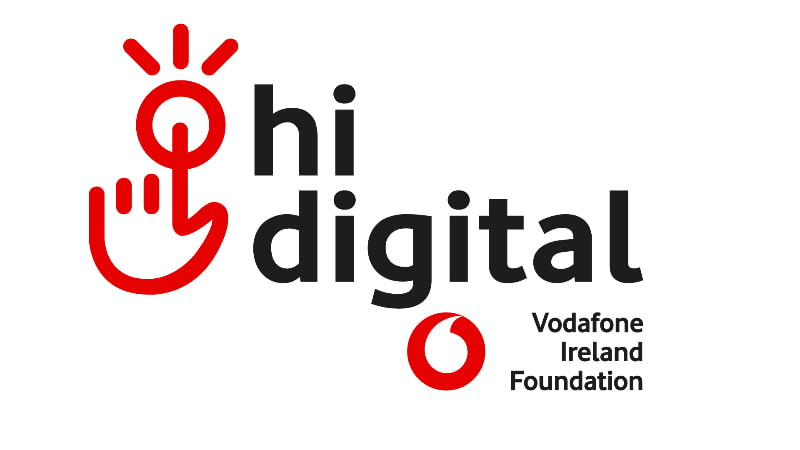Programme: Cork County
WHO Theme: Communication and Information
Funding Stream: • Vodafone gave us iPads
Resources Required: Community Support, Premises, Volunteer Staff
Cost: 0 – 500
Status: Ongoing
Description
Our Hi Digital community project has been showcased by national and international media. Last year our project was the subject of a BBC Story works video that showcased the transformative effect of digital technology. The video features my personal story as a Girl Guide leader for over 45years, who now runs a Hi Digital course in Mitchelstown. The video shows how the programme has changed lives in the community and in a deeply personal way for myself and my husband Pat. This initiative demonstrates the profound impact of digital inclusion and is an inspiring example of using digital technology to change lives. The video has received widespread acclaim and was shortlisted for the prestigious Spider Awards earlier this year. The video can be seen at: Youtube: Hi Digital In Action: BBC Storyworks – The Human Component
I was invited to share the BBC Hi Digital story at the FutureECOS event, attended by 8 partners from 6 different regions involved in the project, from Finland, Croatia, Ireland, Romania, Ukraine and Serbia. The futureECOS project, funded by Interreg Europe, aims to explore innovative ways to future-proof living spaces across its partner regions. As part of this initiative, Inclusive Living was chosen, and the One standout example of Inclusive Living is the HI Digital initiative. This programme addresses the digital divide between generations by empowering older adults to develop essential digital skills. At the same time, it provides younger people with opportunities to gain teaching experience—supporting them in their pursuit of the Gaisce Award. The HI Digital initiative has been recognized by all eight partner regions of the futureECOS project as a highly transferable and adaptable model for communities across Europe. With social and digital isolation affecting older populations in many regions, HI Digital offers a practical, scalable solution to foster intergenerational learning, social inclusion, and digital empowerment.
Eleanor and I were invited o Munster Technology University in Cork, where we had the pleasure of meeting a group of innovative and social-minded students who have developed a unique solution to a growing challenge:
helping older adults stay safe online. In response to the increasing number of cyber threats facing older members of our communities, the students designed a card game that teaches digital safety in an accessible, engaging and empowering way. We were thrilled to see their creativity in action-and even more delighted to be featured on RTE’s 10 things to know which filmed the project on the day. A powerful reminder that with empathy and innovation, we can bridge generations and make technology safer to everyone. RTE 10 things to know
Aim of Initiative
The mission of Hi Digital The mission of Hi Digital is to give everyone free access to the essential tools needed to become digitally independent. Increasing levels of digital literacy can have a positive impact on practical life and mental health. It leads to more opportunities to connect with essential services and engage socially with friends and family. ALONE acts as an intermediary resource for older adult groups looking for support to complete the program, where the Irish Girl Guides go to the group venue to do in person sessions. Irish Girl Guides are expected to teach each older person at least one skill. The older adults and girls are asked to complete post-surveys on the Hi Digital website to track their progress and show they completed the 3-skill requirement. We started this program in partnership with Vodafone Foundation and ALONE. Vodafone provides the funding and the digital skills platform with all the lessons and resources. The Irish Girl Guides support the Units to target a variety of groups and focus on meeting where the older people are at, e.g. churches, active retirement groups, family, and retirement homes.
Who is it aimed at
In Ireland, we are seeing a growing digital divide between generations, with one in four people aged 60-74 and more than half of those aged 75 and over, not using the internet. As more and more of life’s activities move online, we want to enable the digital society to be accessible to all. As services become increasingly digitised, many older people are at risk of being excluded and isolated, posing a long-term threat to their mental health. Through our work with older people in Mitchelstown and in Girl Guide units around Ireland, we are helping older people to overcome the digital divide.
3 Steps critical to success
- Parents / Girls and Community
100% involvement behind this project.
Girls are well trained to act as mentors and have ongoing support from their leaders. - Ol Welcoming the older person with a cuppa and a chat, identifying their needs. Build confidence.
- Allow time for practice and repetition. Reassure learners that mistakes are part of learning at any age.
3 Challenges in Planning / Delivery
- Identifying older adults for participation
- Supporting the girls to get involved as mentors
- Finding the right times for the trainings of the volunteer leaders and the girls
3 Outcomes / Benefits
- Increased intergenerational experience for the girls
- Upskilling the older generation to help them to stay connected with their community.
- Support and grow the connection between the Girl Guides and their local community.
Contact:
Email:
Website: https://www.rte.ie/player/series/10-things-to-know-about/si0000000009?epguid=ai10006667-10-0002

